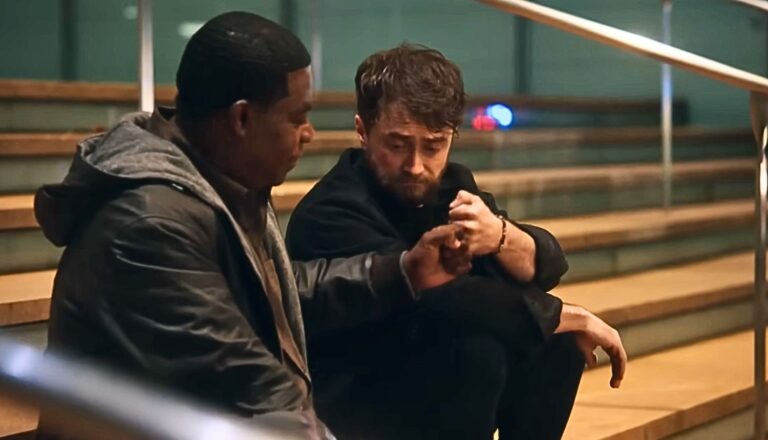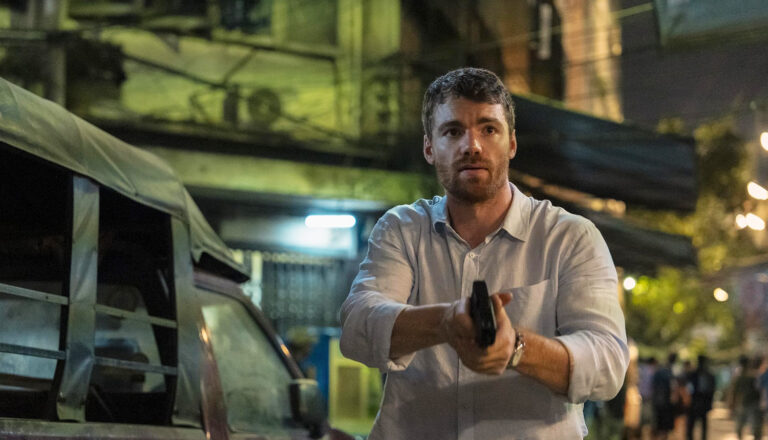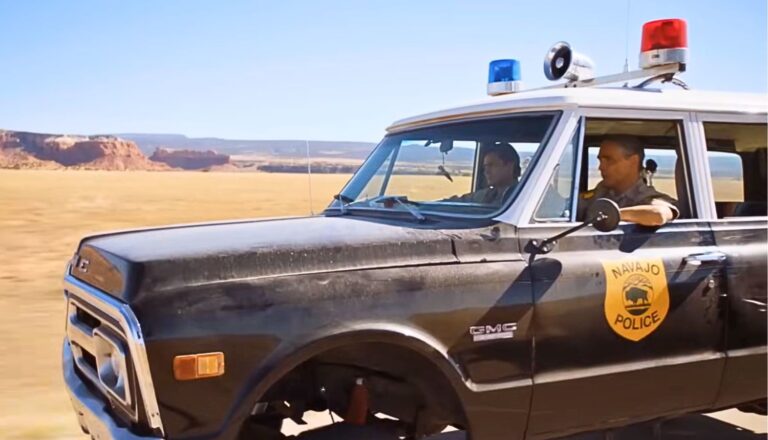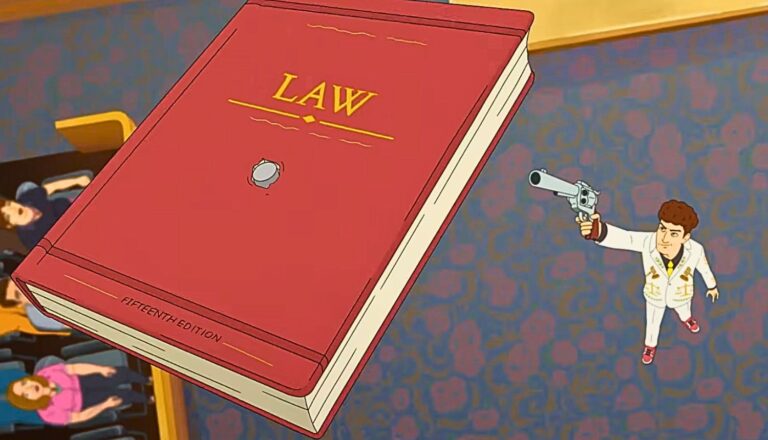
The Fall and Rise of Reggie Dinkins
‘The Fall and Rise of Reggie Dinkins’ is a mockumentary speaking to second chances—though audiences may not want to give it a first chance.

It takes a thief to catch a thief—or so goes the saying. So what does it take to catch an incredibly wealthy businessman who also may be a global gun runner? A man who has stolen the lives of countless people and pilfered the peace of much of the world? British MI6 agent Angela Burr believes you might need the devil himself—or, at least, as close to the devil as you can get.
Not that Jonathan Pine—the guy Angela plucks for the job—is all bad. He’s an Iraq War vet who’d done his share of good deeds and seen his share of horror. And when he was a night manager for a luxury hotel in Cairo, he and his squeeze, Sophie, already tried to bring down one Richard Roper—the devilish soul Sophie calls “the worst man in the world.”
But Sophie wound up dead and Roper—with some high-level help from pals in Britain’s secret service—was never charged. Half a decade later, Jonathan still hasn’t recovered. So when Angela gives him a second chance to take down the guy, Jonathan agrees to go undercover, infiltrating Roper’s Spain-based inner circle.
The costs could be huge. Not only will Mr. Pine’s life be in constant peril, but the gig requires a great deal of, shall we say, moral flexibility. “There is half a psychopath lurking in there, Jonathan,” Angela says, pointing to his head. “I want you to find him and stick to him. Once you get down to Devon, you are the world’s second worst man—first place already taken.”
As the show’s second season begins (nearly 10 years after the first season released), things have finally returned to normal. Jonathan took Roper down and left the frontline operations to the professionals. Then, working under Rex Mayhew, Jonathan took on a new identity—Alex Goodwin—and spent the next five years’ worth of nights leading MI6’s “Night Owls” unit. The nocturnal surveillance team monitors the security feeds of London’s top hotels, the kinds of places where those who’ve become wealthy by means of illicit activities like to conduct business.
It’s through this monitoring that Jonathan spies a familiar face: Jaco Brouwer. Jaco had been in league with Roper back in the day, and it seems the man still works in smuggling weapons. And, based on new intel, it seems Jaco reports to a “Chief”—one who describes himself as “Richard Roper’s true disciple.”
Jonathan senses a new baddie making a name for himself. Rex senses it too, and he urges Jonathan to come see him so they can talk about it in person. But before Jonathan can get there, someone murders Rex, leaving Jonathan to scrounge Rex’s office for any clues his boss may have left behind about who this “Chief” might be.
It’s not long before those clues point him to Teddy Dos Santos, a Colombian man with whom Roper had interacted before. Teddy is well primed to rebuild Roper’s crumbled empire.
It also becomes quickly apparent that MI6 itself may be in league with Teddy.
The Night Manager, based on the book by John le Carré, originally aired on BBC One and then migrated across the pond to AMC. It’s widely praised by critics, scoring a 94% on Rotten Tomatoes. London’s The Sun called it “one of the greatest series of all time.” And, indeed, starring Tom Hiddleston (Loki from The Avengers) and Hugh Laurie (the titular American doctor on House), The Night Manager is well-acted, well-scripted and well-produced.
But, alas, the show is also well-stocked with troublesome content. It’s rated TV-MA, and with reason. A sex scene (with female breast nudity) pocks the very first episode, and when Hiddleston bares his posterior in the fourth episode, over in the U.K. the scene launched its own Twitter hashtag: #Hiddlesbum.
“I’ve come from the tradition of European film, where nudity isn’t really something,” Hiddleston told The Hollywood Reporter. “I’ve seen many other more esteemed actors be infinitely more naked than me. I just don’t think twice about it. It was important for the scene and no more or less significant than any of the other scenes in the story.”
But that’s not the (ahem) end of the problems. While The Night Manager probably can’t be accused of grotesque excesses (in, say, the way American Horror Story or Game of Thrones can), Hiddleston’s character is enmeshed in a terribly violent world, where blood waters the Spanish pavement with the frequency of afternoon rain showers and curse words flutter from the mouths of characters like snow in the Swiss Alps.
Does it take a thief to catch a thief? I’m no expert in thief-catching, so I’ll leave that to the detectives. But I do know this: It doesn’t take a lot of bad content to tell a good story, no matter what you might see on TV.
(Editor’s Note: Plugged In is rarely able to watch every episode of a given series for review. As such, there’s always a chance that you might see a problem that we didn’t. If you notice content that you feel should be included in our review, send us an email at letters@pluggedin.com, or contact us via Facebook or Instagram, and be sure to let us know the episode number, title and season so that we can check it out.)
When Jonathan sees a familiar face from a past life, his investigation into the man’s actions uncovers a larger criminal enterprise.
We watch as a few men are shot and killed. A bomb destroys part of a building, potentially killing many people. Jonathan analyzes photos of blood-covered hostages and dead bodies. We see a covered dead body getting wheeled away; someone alleges the character took his own life with alcohol and pills. Someone identifies a dead body.
Someone says that a man is connected to the Bulgarian mafia “with child trafficking on the side.” He also says that someone’s actions typically indicated a “sexual assignation with the boy on reception.”
We see Jonathan rise out of bed in his boxers.
People drink wine and liquor.
We hear the f-word used four times and the s-word once. We also hear other crudities, including “p-ssed,” “b–tard” and “bloody.” Jesus’ name is used in vain once.
Thieves crash Roper’s dinner party and grab the guy’s son. The kidnapping is ultimately foiled by Jonathan, but the confrontation leaves him a mess. As he recuperates, Roper’s men begin looking into Jonathan’s background and find a rap sheet filled with thievery, assault and murder.
We see Angela warning Jonathan about what this job will entail. “There is no right or wrong down there,” she says. Indeed, he pretends to be a drug dealer, beating and choking a small-time drug peddler, forcing him to swallow his own wares. He beats another man, then stages his house to make it look as though it was murder. (The kitchen is covered in blood.) He breaks someone’s arm, and we see Jonathan with a broken nose and quantities of facial lacerations, etc.
Jonathan has sex with his landlady’s daughter, and we see them in bed together briefly. He barges in on a couple having sex in a deserted house. He showers in a waterfall. (We see him naked from a distance.) There’s a lingering scene in which women dress in lacy undergarments. Incestuous attraction is implied.
There’s a drug deal. Beer, champagne and whiskey are drunk. Cigarettes are smoked. A woman takes a handful of pills. Characters say the s-word twice. Also: “a–,” “b–ch,” “p—,” “h—” and “bloody.” God’s name is misused, twice with “d–n”; Jesus’ is abused twice.

Kennedy Unthank studied journalism at the University of Missouri. He knew he wanted to write for a living when he won a contest for “best fantasy story” while in the 4th grade. What he didn’t know at the time, however, was that he was the only person to submit a story. Regardless, the seed was planted. Kennedy collects and plays board games in his free time, and he loves to talk about biblical apologetics. He’s also an avid cook. He thinks the ending of Lost “wasn’t that bad.”

Paul Asay has been part of the Plugged In staff since 2007, watching and reviewing roughly 15 quintillion movies and television shows. He’s written for a number of other publications, too, including Time, The Washington Post and Christianity Today. The author of several books, Paul loves to find spirituality in unexpected places, including popular entertainment, and he loves all things superhero. His vices include James Bond films, Mountain Dew and terrible B-grade movies. He’s married, has two children and a neurotic dog, runs marathons on occasion and hopes to someday own his own tuxedo. Feel free to follow him on Twitter @AsayPaul.

‘The Fall and Rise of Reggie Dinkins’ is a mockumentary speaking to second chances—though audiences may not want to give it a first chance.

As far as spy thrillers go, The Night Agent is par for the course. But as far as family viewing goes, it might be better to blacklist this one.

AMC+ brings to life a murder-mystery series set in New Mexico, steeped in Navajo ways and filled with dark magic.

‘Strip Law’ is Netflix’s next carbon-copy adult animated comedy whose unoriginality extends even into its crass content.